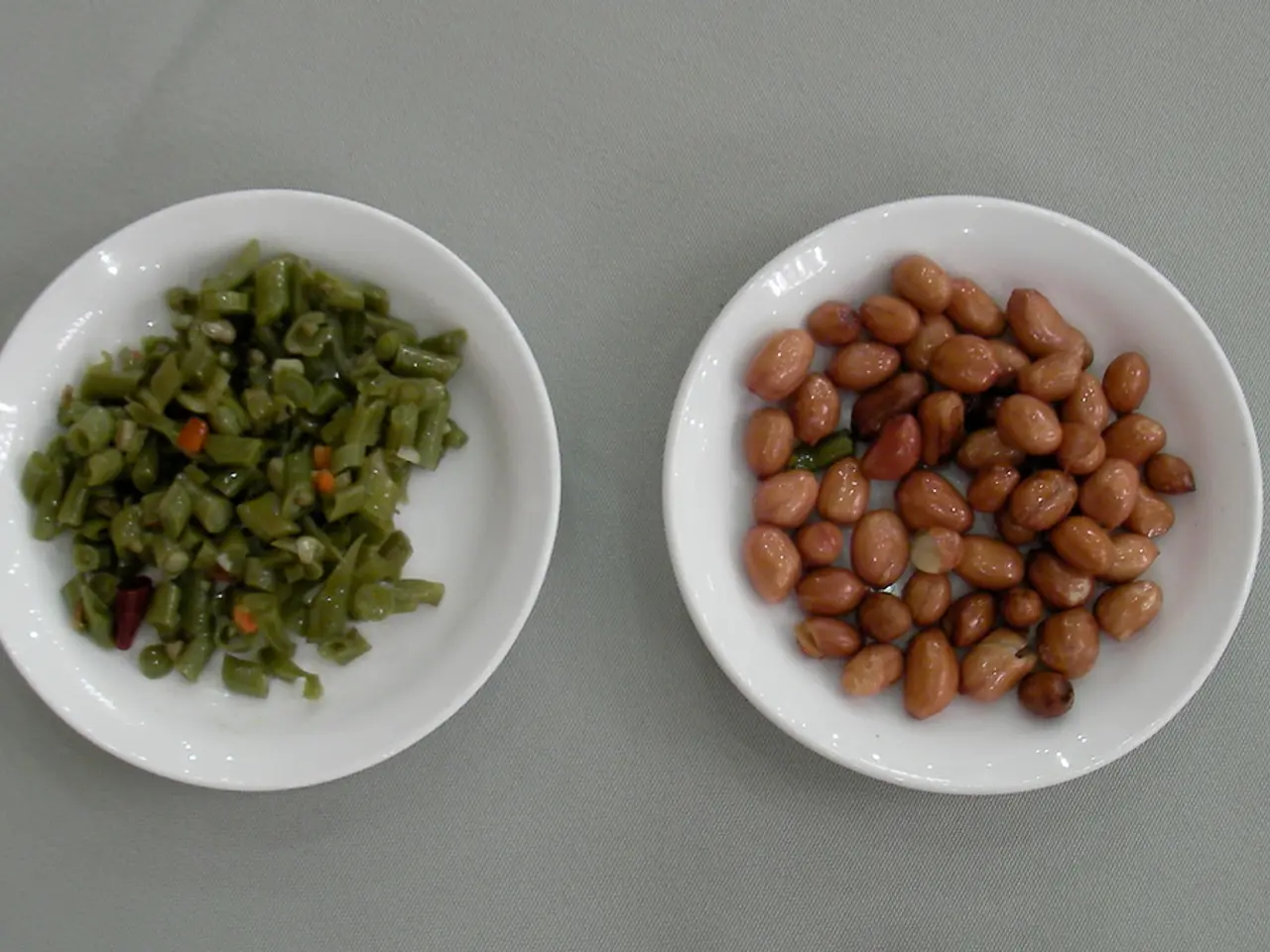Implementing Eggs and Peanuts in Infant Diets Early On May Lower Allergy Risks
In the 70s, food allergies were practically a rarity across classrooms, playgrounds, and households. Now, especially in Australia, the land Down Under, food allergies are rampant – with up to one in ten infants and two in ten school-aged children sporting a proven food allergy.
It's a startling fact: hospital visits for anaphylaxis – a life-threatening allergic reaction – increased by 50% between 1998 and 2012, with kids under five making up the bulk of these incidents. Common allergens include nine food proteins: cow's milk, soy, egg, wheat, peanut, tree nuts, sesame, fish, and seafood, but egg and peanut allergies are the most common in infants and toddlers.
But fear not, there's hope. A groundbreaking study published in the Journal of the American Medical Association (JAMA) shines a light on a game-changer: introducing allergens like egg and peanuts early in a baby's diet significantly reduces the risk of developing allergies to these foods.
This discovery is a game-changer in how parents approach infant feeding. Instead of avoiding allergenic foods as previously recommended, the research suggests that introducing these foods between four and 11 months could lower allergy risks. While the studies do have some limitations, they offer a promising step toward stopping the allergy epidemic.
For years, parents were told to stay clear of allergenic foods when feeding their little ones. It seemed logical: by keeping peanuts, eggs, and other allergens at bay, wouldn't we prevent allergic reactions from developing? This logic shaped dietary guidelines starting in the early 90s. Pregnant and breastfeeding moms were advised to avoid allergenic foods, and parents were instructed to delay introducing foods like peanuts and eggs until much later in childhood.
However, this approach inadvertently backfired. By 2008, researchers began questioning the validity of those older studies, and one major flaw was revealed: families with a history of allergies were more likely to adhere to the avoidance guidelines strictly, skewing the results. In fact, researchers discovered that delaying the introduction of allergenic foods may have actually heightened the risk of food allergies.
A new wave of studies flipped the script on its head. Evidence emerged that introducing allergenic foods earlier – around six months of age – might actually protect infants from developing allergies. This revelation prompted a complete overhaul in feeding recommendations and a deeper investigation into food allergies' root causes.
The latest findings in JAMA affirm what earlier studies hinted at: early exposure to allergens could be the ticket to allergy prevention. Researchers analyzed multiple clinical trials and found modest evidence linking early introduction of peanuts (between four to 11 months) and eggs (from four to six months) to a reduced risk of these allergies.
Interestingly, the study discovered no association between early introduction of gluten (found in wheat) and an increased risk of celiac disease. This implies that while some allergens respond positively to early exposure, others may not follow the same rules.
In summary, while more research is needed to refine the timing and methods of introducing allergenic foods, early exposure to common allergens like egg and peanut can lower the chances of developing allergies to these foods. It's crucial to remember that genetics and other environmental factors can also play a significant role in allergy susceptibility.
For parents navigating the confusing waters of infant feeding, here are some practical tips:
- Start Solids Around Six Months: Introduce a variety of foods, including allergenic ones, when your baby shows readiness for solids.
- Introduce Allergens Early and Often: Start with peanuts and eggs, but also consider other allergenic foods like tree nuts, fish, and sesame in small, safe amounts.
- Watch for Reactions: Introduce one allergen at a time, and monitor for any adverse reactions. If your child experiences eczema or has a family history of allergies, consult your pediatrician before introducing allergens.
- Keep It Balanced: Diversity in your baby's diet is crucial—not just for allergy prevention but for overall health.
In wrapping up, early allergen introduction won't solve the allergy epidemic on its own, but it's a critical piece of the puzzle. Food allergies are a complex interplay of genetics, environment, and early-life exposures, and no single strategy will work for every child.
What's clear is that the old strategy of avoidance is outdated. By embracing early exposure, parents can provide their children the best chance of avoiding life-threatening food allergies. Research continues to uncover new insights into the environmental and biological factors driving food allergies. For now, the updated guidelines offer a hopeful path forward for families tackling this challenging terrain. So, buckle up and bon appétit! For the latest feeding guidelines and resources, visit the Australasian Society of Clinical Immunology and Allergy website.
References:[1] Australian Society of Clinical Immunology and Allergy (ASCIA) Infant Feeding and Allergy Guideline. April 2018. [https://www.allergy.org.au/patients/food-allergy/infant-feeding-guideline/][2] Arshad, S. H., & Theoharides, T. C. (2017). Role of gut microbiota in the pathogenesis of food allergy and intolerance. Biomolecules, 7(1), [1]. [https://www.ncbi.nlm.nih.gov/pmc/articles/PMC5229799/][3] Golden, T. D., & Pongracic, J. A. (2017). Infant and Toddler Nutrition: An Evidence-Based Approach. American Academy of Pediatrics. [https://www.aap.org/en-us/about-the-aap/aap-press/pages/infant-and-toddler-nutrition.aspx][4] Resources – EAT Allergy: European Academy of Allergy and Clinical Immunology. [https://eatallergy.org/resources/][5] Sicherer, S. H. (2017). Food allergies in infants and children: Prevalence, causes, and relief. Pediatrics, 139(Suppl 2), S39-S43. [https://pediatrics.aappublications.org/content/early/2017/02/23/peds.2016-3957]
- The heartening discovery in the Journal of the American Medical Association (JAMA) suggests that early introduction of common allergens like egg and peanut, between four and eleven months, could lower the risk of developing allergies to these foods.
- In navigating the complicated journey of infant feeding, parents should consider starting solids around six months and introducing allergens early and often, taking precautions to watch for adverse reactions.
- While researchers continue to explore the intricate relationship between food allergies, genetics, and environmental factors, early allergen introduction is a significant step in providing children the best chance of avoiding life-threatening food allergies.








